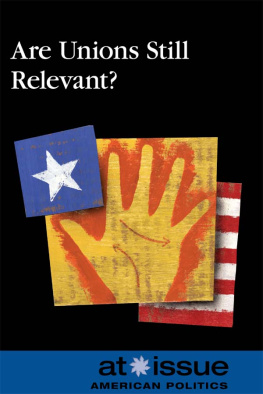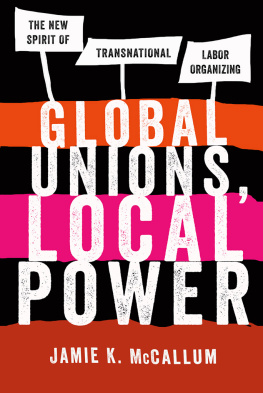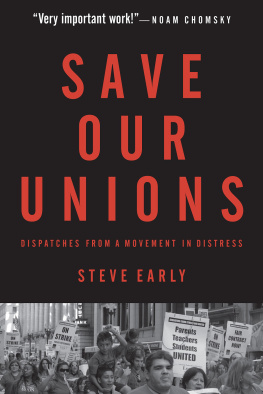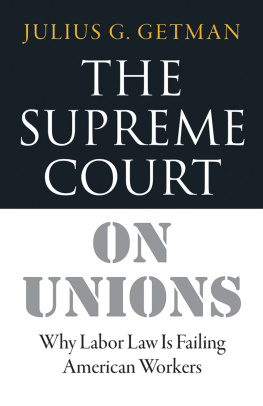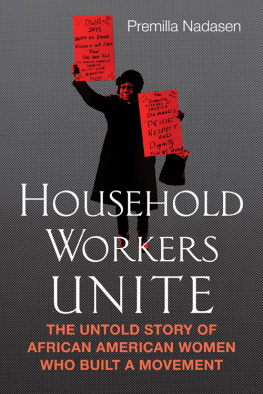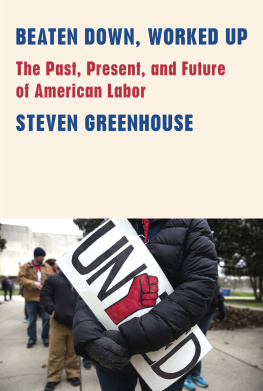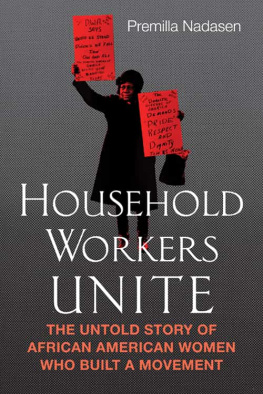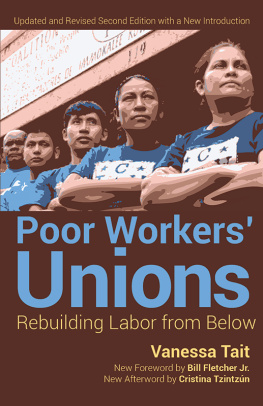Contents
Guide
Pagebreaks of the print version
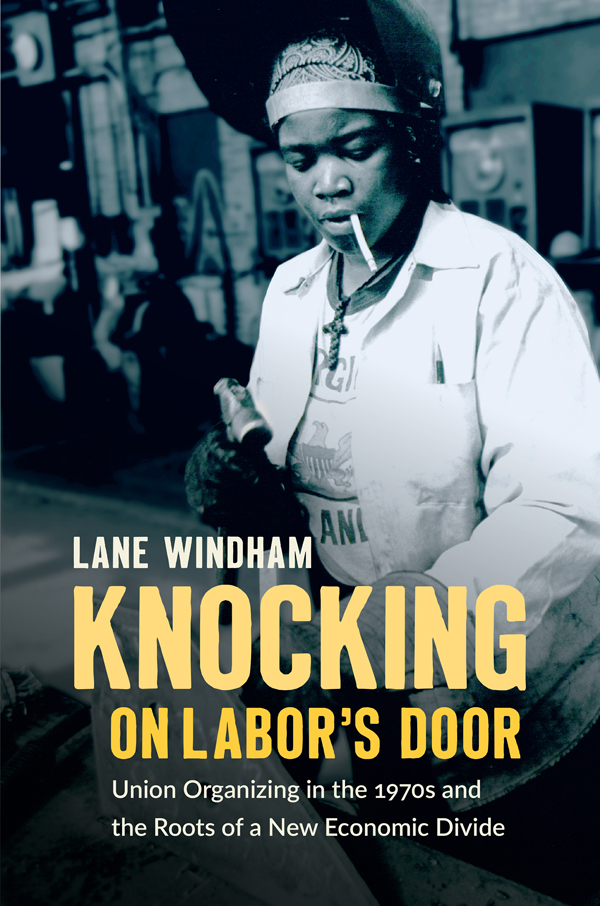
Knocking on Labors Door
Justice, Power, and Politics
COEDITORS
Heather Ann Thompson
Rhonda Y. Williams
EDITORIAL ADVISORY BOARD
Peniel E. Joseph
Matthew D. Lassiter
Daryl Maeda
Barbara Ransby
Vicki L. Ruiz
Marc Stein
The Justice, Power, and Politics series publishes new works in history that explore the myriad struggles for justice, battles for power, and shifts in politics that have shaped the United States over time. Through the lenses of justice, power, and politics, the series seeks to broaden scholarly debates about Americas past as well as to inform public discussions about its future.
More information on the series, including a complete list of books published, is available at http://justicepowerandpolitics.com/.
Knocking on Labors Door
Union Organizing in the 1970s and the Roots of a New Economic Divide

LANE WINDHAM
The University of North Carolina Press Chapel Hill
This book was published with the assistance of the Authors Fund of the University of North Carolina Press.
2017 Lane Windham
All rights reserved
Set in Charis by Westchester Publishing Services
Manufactured in the United States of America
The University of North Carolina Press has been a member of the Green Press Initiative since 2003.
Library of Congress Cataloging-in-Publication Data
Names: Windham, Lane, author.
Title: Knocking on labors door : union organizing in the 1970s and the roots of a new economic divide / Lane Windham.
Other titles: Justice, power, and politics.
Description: Chapel Hill : University of North Carolina Press, [2017] | Series: Justice, power, and politics | Includes bibliographical references and index.
Identifiers: LCCN 2016059292| ISBN 9781469632070 (cloth : alk. paper) | ISBN 9781469632087 (ebook)
Subjects: LCSH : Labor unionsUnited StatesHistory20th century. | Industrial organizationUnited StatesHistory20th century. | Labor movementUnited StatesHistory20th century. | Labor laws and legislationUnited StatesHistory20th century. | LaborUnited StatesHistory.
Classification: LCC HD 8072.5 . W 56 2017 | DDC 331.89/12097309047dc23
LC record available at https://lccn.loc.gov/2016059292
Jacket illustration: Lillian Lightbourne, a welder and member of Ironworkers Local #201 working in a fabrication shop in Washington, D.C., in 1979. Photograph by Martha Tabor, University of Maryland (courtesy of Martha Tabor Collection, University of Maryland Libraries, http://hdl.handle.net/1903.1/35149).
An earlier version of Chapter 4 originally appeared as Signing Up in the Shipyard: Organizing Newport News and Reinterpreting the 1970s, Labor: Studies in Working-Class History of the Americas 10, no. 2 (2013): 3153.
To all who organize for justice
Contents
Figures, Illustrations, and Table
Figures
,
,
,
,
,
,
Illustrations
,
,
,
,
,
,
,
,
,
,
,
,
,
,
Table
, 195
Abbreviations Used in the Text
ACTWU
Amalgamated Clothing and Textile Workers Union
AFA
Association of Flight Attendants
AFL-CIO
American Federation of Labor and Congress of Industrial Organizations
AFSCME
American Federation of State, County, and Municipal Employees
ATMI
American Textile Manufacturers Institute
CBTU
Coalition of Black Trade Unionists
CLUW
Coalition of Labor Union Women
CUAIR
Construction Users Anti-Inflation Roundtable
DRUM
Dodge Revolutionary Union Movement
EEOC
Equal Employment Opportunity Commission
FFACT
Fiber, Fabric, and Apparel Coalition for Trade
GCIU
Graphic Communications International Union
GE
General Electric
GM
General Motors
HERE
Hotel Employees and Restaurant Employees
IAM
International Association of Machinists
IBEW
International Brotherhood of Electrical Workers
ILGWU
International Ladies Garment Workers Union
IUE
International Union of Electrical, Radio, and Machine Workers
LLRG
Labor Law Reform Group
MFA
Multi-Fiber Arrangement
NAACP
National Association for the Advancement of Colored People
NAM
National Association of Manufacturers
NEA
National Education Association
NLRA
National Labor Relations Act
NLRB
National Labor Relations Board
OCAW
Oil, Chemical, and Atomic Workers
PSA
Peninsula Shipbuilders Association
RCIA
Retail Clerks International Association
RCIU
Retail Clerks International Union
SEIU
Service Employees International Union
TWUA
Textile Workers Union of America
UAW
United Auto Workers
UFCW
United Food and Commercial Workers
UFW
United Farm Workers
UMW
United Mine Workers
UNITE
Union of Needletrades, Industrial and Textile Employees
USWA
United Steelworkers of America
Knocking on Labors Door
Introduction
One sweltering July morning in 1976, Jan Hooks, a thirty-one-year old Southern white woman trained as a secretary, crushed a hard hat over her head of unruly curls. The 1970s offered fresh promise for Americas working class, and Hooks wanted in. Growing up in the 1950s, she had watched her father leave each morning for his job at the Newport News Shipbuilding and Dry Dock Company in Virginia. Yet she had never really considered that she might follow in his footsteps. By 1973, things had changed. That year the nations largest private shipbuilder for the navy started recruiting women for production jobs, keeping in step with the federal governments new affirmative action guidelines. Hookss twin sister, Ann Warren, was among the first women hired. Separated from her husband, Hooks was raising two girls alone, and she knew office work would never pay as much as her sisters blue-collar shipyard job. Thats how Hooks soon found herself hauling a toolbox down into the mouth of a nuclear-powered guided-missile cruiser and embarking on her new shipwright career.
Her first assigned task was to clean metal scraps with a three-inch brush in the ships deep recesses, alongside another woman. And I was shaking, tired, scared to death. We sat there until I smoked my cigarette and drank a Pepsi and got myself calmed down. Within a few weeks she began training as a crane operator, and held great pride in her eventual rise to a job that allowed her to drive the 150-ton, eight-story-tall giants with a pocket-size remote control.
Yet Hooks did not just want any job when she crawled down into that ships hold; she wanted a really good job. Though her shipwright position paid better than most jobs available to women, Newport News shipyard workers remained among the lowest-paid shipbuilders in the nation and their pensions were paltry. They began to organize a new union with the United Steelworkers of America (USWA). One crisp and cold January morning in 1978, Hooks served as an official observer for a National Labor Relations Board (NLRB) election at the shipyard involving nineteen thousand workers. Hooks ticked off the welders, riggers, and mechanics names from her polling station by the number 11 dry dock, offering a friendly nod and a smile to those she recognized. Theirs was the largest single workplace union election ever held in the South, and it would be the largest NLRB election held at a single worksite in the nation in the 1970s.


